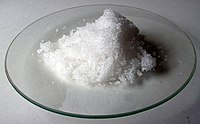
Photo from wikipedia
Abstract Background Dietary nitrates may play a role in mediating several key physiological processes impacting health and/or exercise performance. However, current methods for assessing dietary nitrate (NO3 −) consumption are… Click to show full abstract
Abstract Background Dietary nitrates may play a role in mediating several key physiological processes impacting health and/or exercise performance. However, current methods for assessing dietary nitrate (NO3 −) consumption are inadequate. The present study aimed to examine the dietary nitrate intake in a sample of 50 healthy adults, as well as test the validity of a purposefully developed food frequency questionnaire (FFQ). Methods Dietary nitrate intake was estimated over a week using (i) three 24‐h dietary recalls; (ii) a short‐term (7‐day) FFQ; and (iii) a biomarker (urinary nitrate), in conjunction with a nitrate reference database. Results Daily dietary nitrate intake estimates were 130.94 mg (average of three 24‐h recalls) and 180.62 mg (FFQ). The mean urinary NO3 − excretion was 1974.79 µmol day–1 (or 917.9 µmol L–1). Despite the difference between the two dietary assessment methods, there was a moderate positive correlation (r = 0.736, ρ < 0.001) between the two tools. There was also a positive correlation between urinary NO3 − and 24‐h recall data (r = 0.632, ρ < 0.001), as well as between urinary NO3 − and FFQ (r = 0.579, ρ < 0.001). Conclusions The ability to accurately estimate nitrate intakes depends on having suitable reference methods to estimate the concentrations of nitrate in the food supply, coupled with valid and reliable dietary assessment tools. Based on the findings from the present study, at an individual level, dietary recalls or records may be more accurate in estimating intakes of NO3 −. However, given the lower cost and time needed for administration relative to recalls, the FFQ has merit for estimating NO3 − intakes in health interventions, dietary surveys and surveillance programs.
Journal Title: Journal of Human Nutrition and Dietetics
Year Published: 2022
Link to full text (if available)
Share on Social Media: Sign Up to like & get
recommendations!